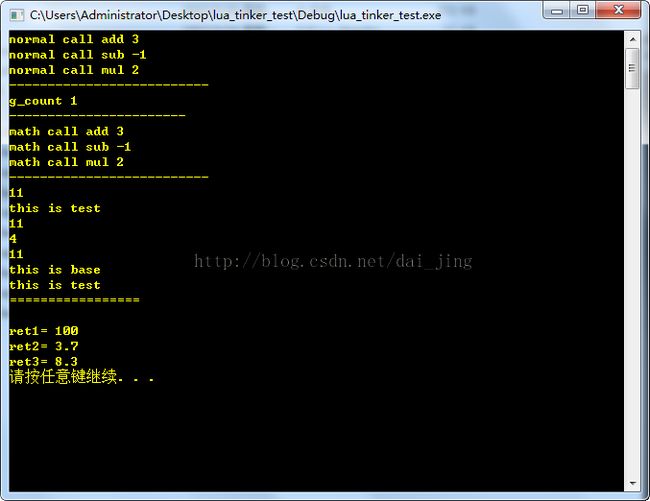c++ 封装luatinker
闲来无聊,把luatinker封装了一层,分享之。。。
// lua_tinker_test.cpp : 定义控制台应用程序的入口点。
//
/************************************************************************/
/*
*author:郑金玮
*time:2014/07/21
*desc:impl luatinker package
*/
/************************************************************************/
#include "stdafx.h"
#include <stdlib.h>
extern "C"
{
#include "..\\lua_tinker\inc\lua.h"
#include "..\\lua_tinker\inc\lualib.h"
#include "..\\lua_tinker\inc\lauxlib.h"
};
#include "..\\lua_tinker\inc\lua_tinker.h"
#include <iostream>
using namespace std;
#pragma comment(lib,"luatinker.lib")
////////////////////全局函数//////////////////////////////////////////////////////
int normal_func_add(int arg1, int arg2)
{
return arg1 + arg2;
}
int normal_func_sub(int arg1, int arg2)
{
return arg1 - arg2;
}
int normal_func_mul(int arg1, int arg2)
{
return arg1 * arg2;
}
////////////////////类//////////////////////////////////////////////////////
class CMathLib
{
public:
CMathLib(){}
~CMathLib(){}
public:
int add(int arg1,int arg2){ return arg1+arg2 ;}
int sub(int arg1,int arg2){ return arg1 - arg2 ;}
int mul(int arg1,int arg2){ return arg1*arg2 ;}
};
struct A
{
A(int v) : value(v) {}
int value;
};
struct base
{
base() {}
const char* is_base(){ return "this is base"; }
};
class test : public base
{
public:
test(int val) : _test(val) {}
~test() {}
const char* is_test(){ return "this is test"; }
void ret_void() {}
int ret_int() { return _test; }
int ret_mul(int m) const { return _test * m; }
A get() { return A(_test); }
void set(A a) { _test = a.value; }
int _test;
};
//全局变量
test g_test(11);
static int g_count=1;
//////////////////////////封装luatinker////////////////////////////////////////////////
class CLua
{
CLua();
~CLua();
public:
static CLua* instance();
public:
int initLua();
int openLuaLib();
int closeLua();
public:
void add();
void runLuaFile();
template<typename T>
T call(const char* luaFuncName,T arg);
template<typename T>
T call(const char* luaFuncName,T arg1,T arg2);
template<typename T>
T call(const char* luaFuncName,T arg1,T arg2,T arg3);
private:
lua_State* m_pState;
};
CLua::CLua()
{
initLua();
openLuaLib();
add();
}
CLua::~CLua()
{
closeLua();
}
CLua* CLua::instance()
{
static CLua __instance;
return &__instance;
}
int CLua::initLua()
{
m_pState= lua_open();
lua_tinker::init(m_pState);
return 0;
}
int CLua::openLuaLib()
{
luaopen_base(m_pState);
//luaopen_io(m_pState);
luaopen_math(m_pState);
luaopen_debug(m_pState);
luaopen_string(m_pState);
return 0;
}
int CLua::closeLua()
{
lua_close(m_pState);
return 0;
}
void CLua::add()
{
lua_tinker::def(m_pState, "normal_add", normal_func_add);
lua_tinker::def(m_pState, "normal_sub", normal_func_sub);
lua_tinker::def(m_pState, "normal_mul", normal_func_mul);
//////////////////////////////////////////////////////////////////////////
lua_tinker::class_add<CMathLib>(m_pState,"CMathLib");
lua_tinker::class_con<CMathLib>(m_pState, lua_tinker::constructor<CMathLib>);
lua_tinker::class_def<CMathLib>(m_pState, "class_add", &CMathLib::add);
lua_tinker::class_def<CMathLib>(m_pState, "class_sub", &CMathLib::sub);
lua_tinker::class_def<CMathLib>(m_pState, "class_mul", &CMathLib::mul);
//////////////////////////////////////////////////////////////////////////
lua_tinker::class_add<base>(m_pState, "base");
lua_tinker::class_def<base>(m_pState, "is_base", &base::is_base);
lua_tinker::class_add<test>(m_pState, "test");
lua_tinker::class_inh<test, base>(m_pState);
lua_tinker::class_con<test>(m_pState, lua_tinker::constructor<test,int>);
lua_tinker::class_def<test>(m_pState, "is_test", &test::is_test);
lua_tinker::class_def<test>(m_pState, "ret_void", &test::ret_void);
lua_tinker::class_def<test>(m_pState, "ret_int", &test::ret_int);
lua_tinker::class_def<test>(m_pState, "ret_mul", &test::ret_mul);
lua_tinker::class_def<test>(m_pState, "get", &test::get);
lua_tinker::class_def<test>(m_pState, "set", &test::set);
lua_tinker::class_mem<test>(m_pState, "_test", &test::_test);
lua_tinker::set(m_pState, "g_test", &g_test);
//////////////////////////////////////////////////////////////////////////
lua_tinker::set(m_pState, "g_count", g_count);
}
void CLua::runLuaFile()
{
lua_tinker::dofile(m_pState, "..\\lua_file\\normal.lua");
lua_tinker::dofile(m_pState, "..\\lua_file\\mathlib.lua");
lua_tinker::dofile(m_pState, "..\\lua_file\\base.lua");
}
template<typename T>
T CLua::call(const char* luaFuncName,T arg)
{
T result = lua_tinker::call<T>(m_pState, luaFuncName, arg);
return result;
}
template<typename T>
T CLua::call(const char* luaFuncName,T arg1,T arg2)
{
T result = lua_tinker::call<T>(m_pState, luaFuncName, arg1,arg2);
return result;
}
template<typename T>
T CLua::call(const char* luaFuncName,T arg1,T arg2,T arg3)
{
T result = lua_tinker::call<T>(m_pState, luaFuncName, arg1,arg2,arg3);
return result;
}
//////////////////////////////////////////////////////////////////////////
#define LUAINSTANCE() CLua::instance()
int _tmain(int argc, _TCHAR* argv[])
{
LUAINSTANCE()->runLuaFile();
cout<<"================="<<endl<<endl;
int ret1 = LUAINSTANCE()->call("lua_add1",100);
double ret2 = LUAINSTANCE()->call("lua_add2",1.2,2.5);
double ret3 = LUAINSTANCE()->call("lua_add3",1.5,2.9,3.9);
cout<<"ret1= "<<ret1<<endl;
cout<<"ret2= "<<ret2<<endl;
cout<<"ret3= "<<ret3<<endl;
system("pause");
return 0;
}
lua文件:
base.lua
print(g_test._test) print(g_test:is_test()) print(g_test:ret_int()) temp = test(4) print(temp._test) a = g_test:get() temp:set(a) print(temp._test) print(temp:is_base()) print(temp:is_test())
mathlib.lua
print("--------------------------")
print("g_count " .. g_count)
print("-----------------------")
temp = CMathLib()
print("math call add " .. tostring(temp:class_add(1,2)))
print("math call sub " .. tostring(temp:class_sub(1,2)))
print("math call mul " .. tostring(temp:class_mul(1,2)))
print("--------------------------")
function lua_add2(a,b)
return a+b;
end
function lua_add3(a,b,c)
return a+b+c;
end
function lua_add1(a)
return a;
end
print("normal call add " .. tostring(normal_add(1,2)))
print("normal call sub " .. tostring(normal_sub(1,2)))
print("normal call mul " .. tostring(normal_mul(1,2)))

base.lua